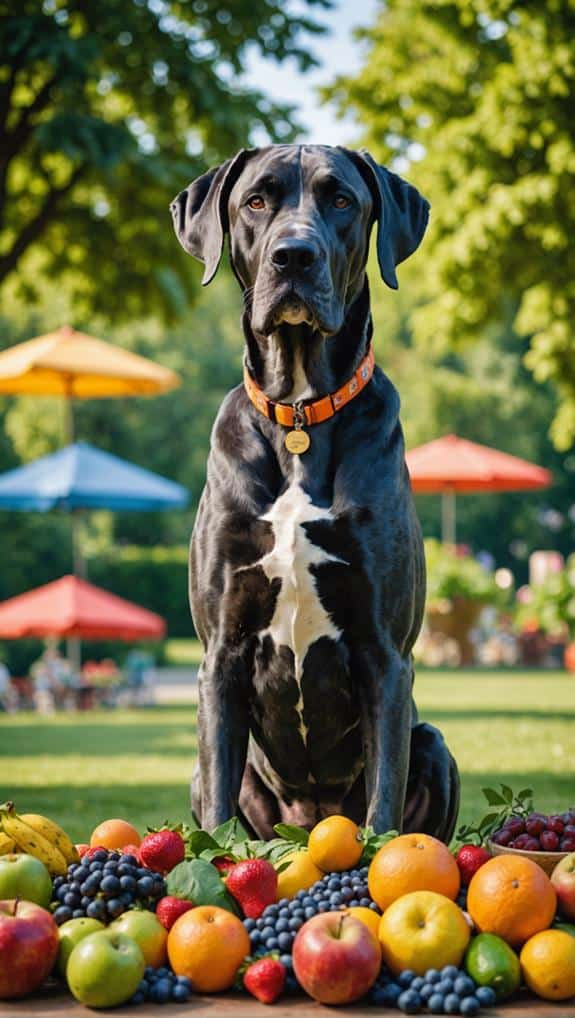When it comes to your dog’s nutrition, understanding their unique needs, recognizing the right vitamins, and addressing breed-specific health concerns are essential. Large breeds often require Vitamin D for strong bones, while small breeds thrive on B vitamins to fuel their metabolism. Breeds with skin sensitivities benefit greatly from Vitamin E and Omega-3 fatty acids for healthier skin. Each vitamin plays a pivotal role, but how do you determine the best options for your furry friend? Exploring these specifics can lead you to a more tailored approach to your dog’s diet. Additionally, it’s important to consider the differences in nutritional requirements among various dog breeds, including rabbit breeds and their nutrition, as they may have distinct dietary needs. Consulting with a veterinarian or pet nutritionist can provide insights specific to your dog’s breed, size, and age, ensuring you choose the best supplements and foods. By being attentive to these factors, you can help promote optimal health and longevity for your beloved companion.
Contents
Vitamins for Large Breeds

When it comes to the nutritional needs of large breed dogs, specific vitamins play a fundamental role in their development and overall health.
Vitamins D, E, and the B-vitamin complex are particularly important for these dogs, ensuring they grow strong and healthy.
Vitamin D aids in calcium absorption, which is imperative for large breed skeletons, helping to prevent conditions like rickets and hip dysplasia. Adequate calcium levels are essential for bone growth and structural integrity.
Vitamin E serves as a powerful antioxidant, reducing oxidative stress on muscles and enhancing immune function. This is especially significant for large breeds that may face more physical challenges due to their size.
Additionally, the B-vitamin complex is crucial for energy metabolism and muscle development, ensuring your dog has the stamina needed for an active lifestyle.
While natural sources of these vitamins are beneficial, supplementation may be necessary to meet your dog's specific needs.
However, it's important to monitor this supplementation closely and consult with a veterinarian to avoid potential excesses that could lead to health complications.
Vitamins for Small Breeds
For small breed dogs, specific vitamins are essential to support their unique metabolic needs and health considerations.
These dogs often have higher metabolic rates, necessitating increased levels of B vitamins, particularly B12 and niacin, to meet their energy demands. Vitamin D plays an important role in calcium absorption, promoting strong bones and preventing skeletal issues common to small breeds.
Moreover, smaller dogs require higher concentrations of vitamin A, which is crucial for maintaining good vision and a robust immune system.
Antioxidants like vitamin E and vitamin C are also important, as they help combat oxidative stress, especially given the longer lifespans associated with smaller breeds.
Incorporating these vitamins into a balanced diet, along with essential fatty acids, is key to ensuring healthy skin and a shiny coat.
This is particularly important for small breeds with fine fur that can easily show signs of deficiency.
Vitamins for Breeds With Skin Issues

Many breeds, such as Bulldogs and Dachshunds, are prone to skin issues that can greatly impact their quality of life. To address these concerns, ensuring your dog receives the right vitamins is essential for maintaining ideal skin health.
Here are key vitamins to take into account:
- Vitamin E: Acts as an antioxidant, reducing inflammation and promoting healthy skin.
- Omega-3 Fatty Acids: Supports skin health by improving hydration and reducing irritation.
- Vitamin A: Necessary for cell turnover and repair, particularly beneficial for breeds like Golden Retrievers with skin allergies.
- B Vitamins: Important for enhancing skin barrier function, especially Niacin (B3) and Riboflavin (B2), which can help reduce hotspots in breeds like Cocker Spaniels.
Additionally, supplementing with Vitamin C can help alleviate skin irritations and boost collagen production, proving beneficial for breeds predisposed to skin conditions.
Regular veterinary check-ups are also fundamental in managing these issues effectively. By being proactive about your dog's nutritional needs, you can markedly improve their skin health and overall well-being.
Final Thoughts
To conclude, it's a common misconception that all dog breeds require the same vitamins for ideal health. In reality, large breeds thrive on Vitamin D for proper bone development, while small breeds need B vitamins to fuel their high metabolism. For breeds with skin issues, Vitamin E and Omega-3 fatty acids are essential for maintaining skin health. Tailoring your dog's vitamin intake to their specific breed can greatly enhance their overall well-being and longevity.






